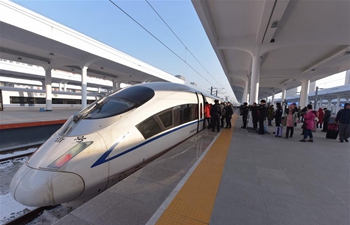by Edgardo Loguercio
BRASILIA, Dec. 25 (Xinhua) -- With just a week to go before Brazil's president-elect Jair Bolsonaro takes office, one key question hangs in the air: how well will he work with Brazilian lawmakers?
It's a relevant question as Latin America's largest economy and one of the world's emerging economies aims to adopt strategic reforms to promote economic recovery following a severe recession.
During his election campaign, Bolsonaro promised to shake up the political establishment, which is widely seen as corrupt and self-serving.
While Bolsonaro's Social Liberal Party (PSL) got enough votes to become the second-biggest political group in the Chamber of Deputies, the lower house of the Congress, with 52 seats, his administration cannot count on the solid backing of parliament.
With that in mind, Bolsonaro has already begun to pursue dialogue with the most powerful interest groups represented in the Congress, which are locally known as the "Three Bs" -- Buey (ox), Biblia (Bible) and Bala (Bullets) -- and refer to the farming sector, evangelicals and the arms-security industry.
This strategy aims to replace the traditional wheeling and dealing between the executive branch and Brazil's numerous political parties and their members in the Congress.
The strategy is also borne out by Bolsonaro's cabinet picks, which include only four of the 30 parties that won deputy seats.
Bolsonaro's appointed cabinet chief Onyx Lorenzoni, a member of the Democrats party, will also oversee the ministries of Health and Agriculture. The PSL will be in charge of the ministries of Tourism and Science and Technology. The Brazilian Democratic Movement will head the Ministry of Citizenship, and the New Party will take up the reins at the Environment Ministry.
One problem is that the new Congress seems to lack seasoned legislators with the experience to marshal votes when necessary, which could make it tough to pass proposed reforms.
David Fleischer, a political analyst at the University of Brasilia, says Bolsonaro's strategy will "probably not be enough" to ensure the legislative support he needs, leading to eventual compromise and a return to traditional negotiating methods.
"The people who distribute the benefits are the leaders of each party, who decide which congressional committee each deputy will be on and how to allot party funds," said Fleischer.
"So, the party leaders are more powerful than the interest groups," he said.
However, Bolsonaro does have a card up his sleeve, and that's his followings on social networks, said the analyst.
"I think he will use the same technique he did during his campaign of using social networks to put pressure on the deputies ... It's a possibility and it would mark a new development in relations with the Congress," said Fleischer.
Still, Bolsonaro's decades in the Congress as a deputy means he knows how the dynamics of give-and-take work, he noted.
"Bolsonaro has 23,000 federal posts to distribute among the deputies, highly coveted posts. That has been the traditional bargaining chip between the president and the Congress, and there are indications that's going to continue," he said.
Antonio Augusto de Queiroz, a political observer and director of the Parliamentary Consulting Inter-Union Department, a lobbying group, believed Bolsonaro is in the same boat as other presidents before him who lacked a majority in the Congress.
To build consensus, he believed, Bolsonaro must resort to the three tools presidents have always had at their disposal: assigning posts, assigning budget and negotiating the content of public policy.
Bolsonaro's particular challenge will be implementing his neoliberal economic agenda, which will meet strong resistance from some sectors, and to bring about change fast enough to please Brazilians eager to see results.
"The people are expecting effective measures to combat violence and crime, but also to improve employment and income, expand and improve the quality of public services, and fight corruption," said de Queiroz.
All of that requires ambitious reforms as well as fiscal austerity.
"When the incoming president takes office, he will perceive the complexity of the decision-making process, and he could become frustrated with the lack of impact his actions have, especially if he neglects the relationship with the parties in the Congress," warned de Queiroz.
"The future of democracy in Brazil will depend on how he reacts," he added.

















